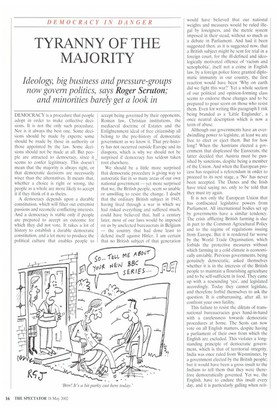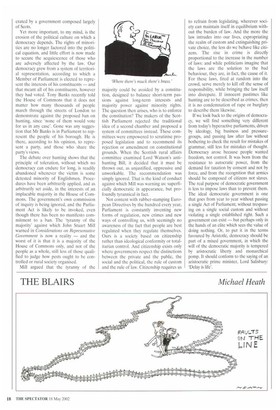TYRANNY OF THE MAJORITY
Ideology, big business and pressure-groups
now govern politics, says Roger Scruton;
and minorities barely get a look in
DEMOCRACY is a procedure that people adopt in order to make collective decisions. It is not the only such procedure. Nor is it always the best one. Some decisions should be made by experts; some should be made by those in authority or those appointed by the law. Some decisions should not be made at all. But people are attracted to democracy, since it seems to confer legitimacy. This doesn't mean that the majority is always right, or that democratic decisions are necessarily wiser than the alternatives. It means that, whether a choice is right or wrong, the people as a whole are more likely to accept it if they think of it as theirs.
A democracy depends upon a durable constitution. which will filter out extremist passions and reconcile conflicting interests. And a democracy is stable only if people are prepared to accept an outcome for which they did not vote. It takes a lot of history to establish a durable democratic constitution, and a lot more to produce the political culture that enables people to accept being governed by their opponents. Roman law, Christian institutions, the mediaeval doctrine of Estates and the Enlightenment ideal of free citizenship all belong to the pre-history of democratic government as we know it. That pre-history has not occurred outside Europe and its diaspora, which is why we should not be surprised if democracy has seldom taken root elsewhere.
We should be a little more surprised that democratic procedure is giving way to autocratic fiat in so many areas of our own national government yet more surprised that we, the British people, seem so unable or unwilling to resist the change. I doubt that the ordinary British subject in 1945, having lived through a war in which we had risked everything and suffered much, could have believed that, half a century later, most of our laws would be imposed on us by unelected bureaucrats in Belgium — the country that had done least to defend itself against Hitler. I am certain that no British subject of that generation would have believed that our national weights and measures would be ruled illegal by foreigners, and the metric system imposed in their stead, without so much as a debate in Parliament. And had it been suggested then, as it is suggested now, that a British subject might be sent for trial in a foreign court, for the ill-defined and ideologically motivated offence of 'racism and xenophobia', itself not a crime in English law, by a foreign police force granted diplomatic immunity in our country, the first reaction would have been 'Why on earth did we fight this war?' Yet a whole section of our political and opinion-forming class seems to endorse these changes and to be prepared to pour scorn on those who resist them. Even for writing this paragraph I risk being branded as a 'Little Englander', a once neutral description which is now a term of abuse.
Although our governments have an everdwindling power to legislate, at least we are free to elect or eject them. But for how long? When the Austrians elected a government that displeased the Eurocrats, the latter decided that Austria must be punished by sanctions, despite being a member of the Union. And when the European process has required a referendum in order to proceed to its next stage, a 'No' has never been accepted. The Danes and the Irish have tried saying no, only to be told that they must try again.
It is not only the European Union that has confiscated legislative powers from Parliament. All international bodies set up by governments have a similar tendency. The crisis afflicting British farming is due in part to the Common Agricultural Policy and to the regime of regulations issuing from Europe. But it is rendered far worse by the World Trade Organisation, which forbids the protective measures without which farming in a cold climate is economically unviable. Previous governments, being genuinely democratic, asked themselves whether it is in the interests of the British people to maintain a flourishing agriculture and to be self-sufficient in food. They came up with a resounding 'yes', and legislated accordingly. Today they cannot legislate, and therefore forbid themselves to ask the question. It is embarrassing, after all, to confront your own futility.
This failure to resist the diktats of transnational bureaucracies goes hand-in-hand with a carelessness towards democratic procedures at home. The Scots can now vote on all English matters, despite having a parliament of their own from which the English are excluded. This violates a longstanding principle of democratic government, which is that of territorial integrity. India was once ruled from Westminster, by a government elected by the British people; but it would have been a gross insult to the Indians to tell them that they were therefore democratically governed. Yet we, the English, have to endure this insult every day, and it is particularly galling when reit
erated by a government composed largely of Scots.
Yet more important, to my mind, is the erosion of the political culture on which a democracy depends. The rights of minorities are no longer factored into the political equation, and little effort is now made to secure the acquiescence of those who are adversely affected by the law. Our democracy grew from a system of territorial representation, according to which a Member of Parliament is elected to represent the interests of his constituents — and that meant all of his constituents, however they had voted. Tony Banks recently told the House of Commons that it does not matter how many thousands of people march through the streets of London to demonstrate against the proposed ban on hunting, since 'none of them would vote for us in any case'. Gone was any suggestion that Mr Banks is in Parliament to represent the people of his borough. He is there, according to his opinion, to represent a party, and those who share the party's views.
The debate over hunting shows that the principle of toleration, without which no democracy can endure for long, is readily abandoned whenever the victim is some detested minority of Englishmen. Procedures have been arbitrarily applied, and as arbitrarily set aside, in the interests of an implacable majority in the House of Commons. The government's own commission of inquiry is being ignored, and the Parliament Act is likely to be invoked, even though there has been no manifesto commitment to a ban. The 'tyranny of the majority' against which John Stuart Mill warned in Considerations on Representative Government is now a reality — and the worst of it is that it is a majority of the House of Commons only, and not of the people as a whole, still less of those qualified to judge how pests ought to be controlled or rural society organised.
Mill argued that the tyranny of the majority could be avoided by a constitution, designed to balance short-term passions against long-term interests and majority power against minority rights. The question then arises, who is to enforce the constitution? The makers of the Scottish Parliament rejected the traditional idea of a second chamber and proposed a system of committees instead. These committees were empowered to scrutinise proposed legislation and to recommend its rejection or amendment on constitutional grounds. When the Scottish rural affairs committee examined Lord Watson's antihunting Bill, it decided that it must be thrown out, as unjustified, oppressive and unworkable. The recommendation was simply ignored. That is the kind of conduct against which Mill was warning us: superficially democratic in appearance, but profoundly tyrannical in fact.
Not content with rubber-stamping European Directives by the hundred every year, Parliament is constantly inventing new forms of regulation, new crimes and new ways of controlling us, with seemingly no awareness of the fact that people are best regulated when they regulate themselves. Ours is a society based on citizenship rather than ideological conformity or totalitarian control. And citizenship exists only where governments respect the distinctions between the private and the public, the social and the political, the rule of custom and the rule of law. Citizenship requires us to refrain from legislating, wherever society can maintain itself in equilibrium without the burden of law. And the more the law intrudes into our lives, expropriating the realm of custom and extinguishing private choice, the less do we behave like citizens. The rise in crime is directly proportional to the increase in the number of laws: and while politicians imagine that the laws are the solution to the bad behaviour, they are, in fact, the cause of it. For these laws, fired at random into the crowd, serve merely to kill off the sense of responsibility, while bringing the law itself into disrepute. If innocent pastimes like hunting are to be described as crimes, then it is no condemnation of rape or burglary to describe them likewise.
If we look back to the origins of democracy, we will find something very different from today's hyperactive parliaments, driven by ideology, big business and pressuregroups, and passing law after law without bothering to check the result for mistakes of grammar, still less for mistakes of thought. Democracy arose because people wanted freedom, not control. It was born from the resistance to autocratic power, from the demand for taxation by consent and not by force, and from the recognition that armies should be composed of citizens not slaves. The real purpose of democratic government is less to impose laws than to prevent them. The ideal democratic government is one that goes from year to year without passing a single Act of Parliament, without trespassing on a single social custom and without violating a single established right. Such a government can exist — but perhaps only in the hands of an elite which sees the value of doing nothing. Or, to put it in the terms favoured by Aristotle, democracy should be part of a mixed government, in which the will of the democratic majority is tempered by aristocratic liberty and monarchical pomp. It should conform to the saying of an aristocratic prime minister, Lord Salisbury: 'Delay is life'.















































































 Previous page
Previous page